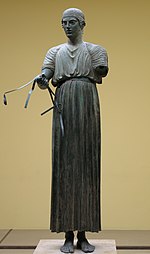Oracle of Delphi Croesus of Lydia | References | Navigation menue
Greek mythology
Ancient GreeceApolloTemple of ApolloDelphiMount ParnassusGreeceambiguousOleanderBCThebesPersiansMedesCyrusPersian
Oracle of Delphi
Jump to navigation
Jump to search
The Oracle of Delphi was an institution in Ancient Greece, dedicated to the god Apollo. Only one priestess operated at Delphi at any one time, and the name given to her was 'the Pythia'. The woman gave up her own name when she became priestess.[1]
The Temple of Apollo was at Delphi, on the slopes of Mount Parnassus in Greece. According to legend, the god answered questions through the medium of his priestess, who was famous for her ambiguous predictions. Scholars from time to time have suggested that burning Oleander or volcanic gases played their part in her strange utterings.[2]
Croesus of Lydia |
In 560 BC Croesus, King of Lydia,[3] selected the Delphic Oracle and the Oracle at Thebes for advice. He asked if he should make war on the Persians. Both oracles gave the same response, that if Croesus made war on the Persians, he would destroy a mighty empire. They also advised him to seek out the most powerful Greek peoples and make alliance with them.
Croesus paid a high fee to the Delphians and then sent to the oracle asking "Would his monarchy last long?" The Pythia answered:
- Whenever a mule shall become sovereign king of the Medes, then flee, and think not to stand fast, nor shame to be chicken-hearted.[4]
Croesus thought it impossible that a mule should be king of the Medes and thus believed that he and his issue would never be out of power. He thus decided to make common cause with certain Greek city states and attack Persia.[4]
However, it was he, not the Persians, who was defeated. This fulfilled the prophecy but not his interpretation of it. Apparently, he forgot that Cyrus, the victor, was half Mede (by his mother), half Persian (by his father) and so could be considered a mule.[5]
References |
↑ Broad, William J. 2006. The Oracle: the lost secrets and hidden message of ancient Delphi. London: Penguin. .mw-parser-output cite.citationfont-style:inherit.mw-parser-output .citation qquotes:"""""""'""'".mw-parser-output .citation .cs1-lock-free abackground:url("//upload.wikimedia.org/wikipedia/commons/thumb/6/65/Lock-green.svg/9px-Lock-green.svg.png")no-repeat;background-position:right .1em center.mw-parser-output .citation .cs1-lock-limited a,.mw-parser-output .citation .cs1-lock-registration abackground:url("//upload.wikimedia.org/wikipedia/commons/thumb/d/d6/Lock-gray-alt-2.svg/9px-Lock-gray-alt-2.svg.png")no-repeat;background-position:right .1em center.mw-parser-output .citation .cs1-lock-subscription abackground:url("//upload.wikimedia.org/wikipedia/commons/thumb/a/aa/Lock-red-alt-2.svg/9px-Lock-red-alt-2.svg.png")no-repeat;background-position:right .1em center.mw-parser-output .cs1-subscription,.mw-parser-output .cs1-registrationcolor:#555.mw-parser-output .cs1-subscription span,.mw-parser-output .cs1-registration spanborder-bottom:1px dotted;cursor:help.mw-parser-output .cs1-ws-icon abackground:url("//upload.wikimedia.org/wikipedia/commons/thumb/4/4c/Wikisource-logo.svg/12px-Wikisource-logo.svg.png")no-repeat;background-position:right .1em center.mw-parser-output code.cs1-codecolor:inherit;background:inherit;border:inherit;padding:inherit.mw-parser-output .cs1-hidden-errordisplay:none;font-size:100%.mw-parser-output .cs1-visible-errorfont-size:100%.mw-parser-output .cs1-maintdisplay:none;color:#33aa33;margin-left:0.3em.mw-parser-output .cs1-subscription,.mw-parser-output .cs1-registration,.mw-parser-output .cs1-formatfont-size:95%.mw-parser-output .cs1-kern-left,.mw-parser-output .cs1-kern-wl-leftpadding-left:0.2em.mw-parser-output .cs1-kern-right,.mw-parser-output .cs1-kern-wl-rightpadding-right:0.2em
ISBN 1-59420-081-5
↑ de Boer, Jelle Zeilinga, John Rigby Hale & Henry A. Spiller, 2006. The Delphic Oracle: a multidisciplinary defense of the gaseous vent theory. Clinical Toxicology 40 (2) 189–196.
↑ Lydia: an iron age kingdom in western Asia Minor.
↑ 4.04.1 Herodotus, "The History" trans. David Grene, The University of Chicago Press, 1988, I.55
↑ Herodotus, "Histories" (Penguin Classics, Harmondsworth
Category:
- Greek mythology
(RLQ=window.RLQ||[]).push(function()mw.config.set("wgPageParseReport":"limitreport":"cputime":"0.152","walltime":"0.196","ppvisitednodes":"value":417,"limit":1000000,"ppgeneratednodes":"value":0,"limit":1500000,"postexpandincludesize":"value":20411,"limit":2097152,"templateargumentsize":"value":518,"limit":2097152,"expansiondepth":"value":13,"limit":40,"expensivefunctioncount":"value":0,"limit":500,"unstrip-depth":"value":1,"limit":20,"unstrip-size":"value":3892,"limit":5000000,"entityaccesscount":"value":0,"limit":400,"timingprofile":["100.00% 140.004 1 -total"," 83.11% 116.362 1 Template:Reflist"," 69.77% 97.687 1 Template:ISBN"," 51.46% 72.048 1 Template:Catalog_lookup_link"," 16.70% 23.381 1 Template:Ancient_Greece:_Arts_and_Culture"," 13.77% 19.284 1 Template:Navbox"," 7.17% 10.044 1 Template:Error-small"," 5.68% 7.956 1 Template:Small"," 3.72% 5.204 3 Template:Yesno-no"," 2.79% 3.909 2 Template:Main_other"],"scribunto":"limitreport-timeusage":"value":"0.017","limit":"10.000","limitreport-memusage":"value":872405,"limit":52428800,"cachereport":"origin":"mw1268","timestamp":"20190625154622","ttl":2592000,"transientcontent":false););"@context":"https://schema.org","@type":"Article","name":"Oracle of Delphi","url":"https://simple.wikipedia.org/wiki/Oracle_of_Delphi","sameAs":"http://www.wikidata.org/entity/Q682558","mainEntity":"http://www.wikidata.org/entity/Q682558","author":"@type":"Organization","name":"Contributors to Wikimedia projects","publisher":"@type":"Organization","name":"Wikimedia Foundation, Inc.","logo":"@type":"ImageObject","url":"https://www.wikimedia.org/static/images/wmf-hor-googpub.png","datePublished":"2012-01-08T01:47:38Z","dateModified":"2018-06-28T00:46:45Z"(RLQ=window.RLQ||[]).push(function()mw.config.set("wgBackendResponseTime":93,"wgHostname":"mw1331"););
